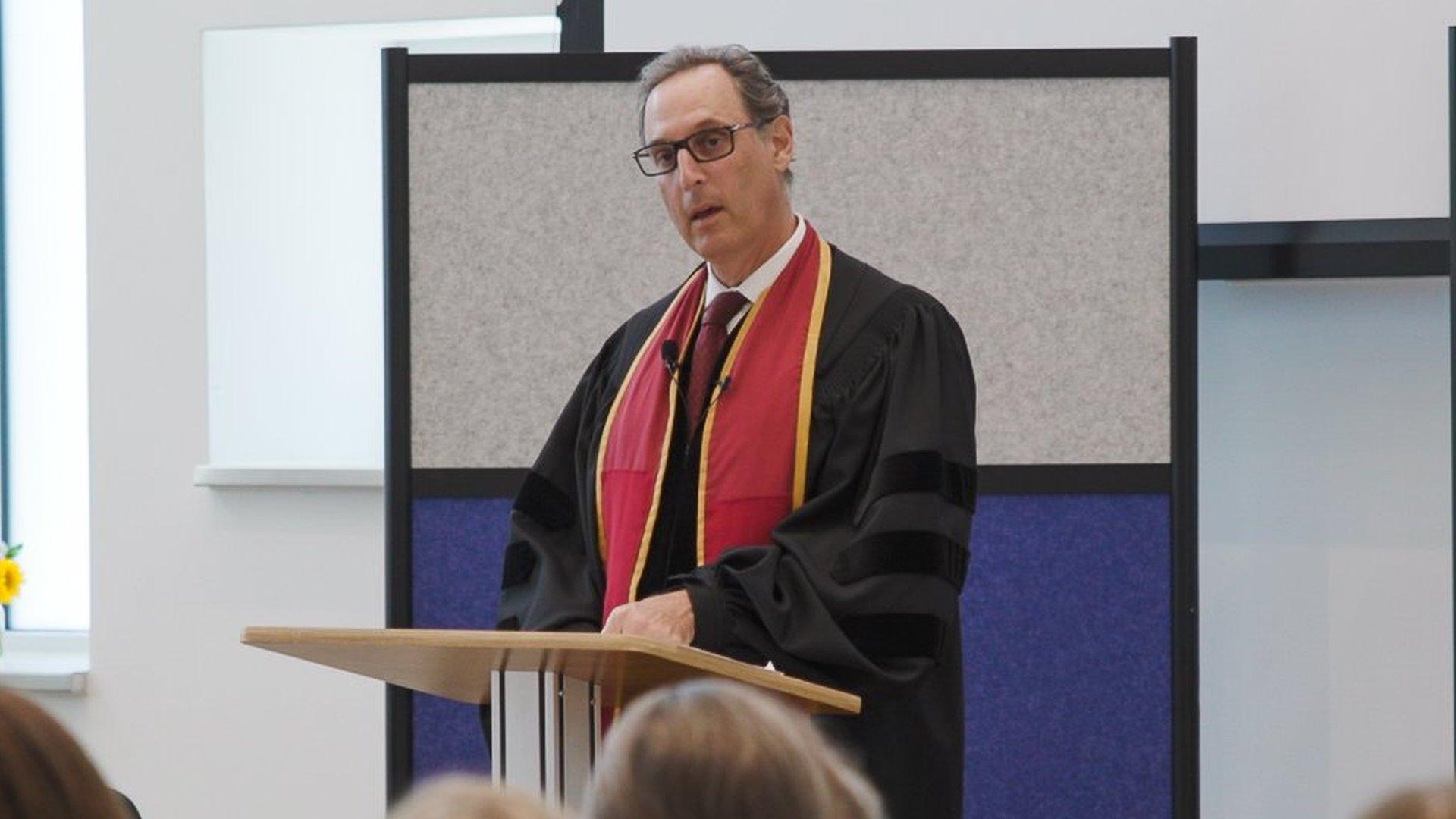Roe v Wade: Hen parties get political in post-Roe Nashville
- Published
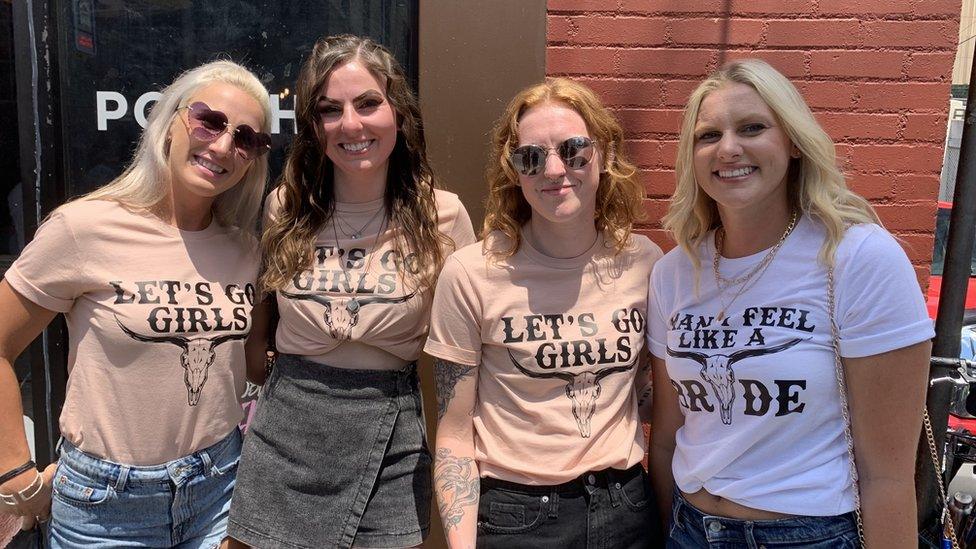
Courtney Fisch (right) is having a hen night in Nashville before her wedding
Every weekend thousands of women descend on Nashville, Tennessee - one of the most popular cities for hen nights in America - to mark their final nights of singledom. But this weekend, women celebrating life's milestones also reflected on the meaning of another turning point - the overturning of Roe v Wade.
"It means I'll be sleeping with a lot less Republicans!" joked Mallory, ruffling her hair under the neon lights of the karaoke bar in downtown Nashville where she's attending her friend's bachelorette party. The theme is pink, baby pink, and she's fully committed to it.
Meanwhile, open-air party buses, weighed down by booze, race round street corners as the smell of fried chicken wafts through crowds of matching cowboy hats.
"But seriously?" she said, the enormity sinking in. "I'm sick to my stomach and hate to hear it. Because men are out here making decisions on our bodies and it's going to impact everybody."
She was reacting to the Supreme Court's decision to end nearly 50 years of women's rights to have abortions. Over the past few days, the city has felt like a microcosm of the country's divided emotions with parties soon turning into protests, and humour into heartache.
"I'm mad because I'm processing my feelings on it," says Courtney Fisch, 28, who is about to get married. "It's nobody's business. Some person sitting up in a chair in government should not be making that decision for me." Her friend agrees, sticking her middle finger up in protest.
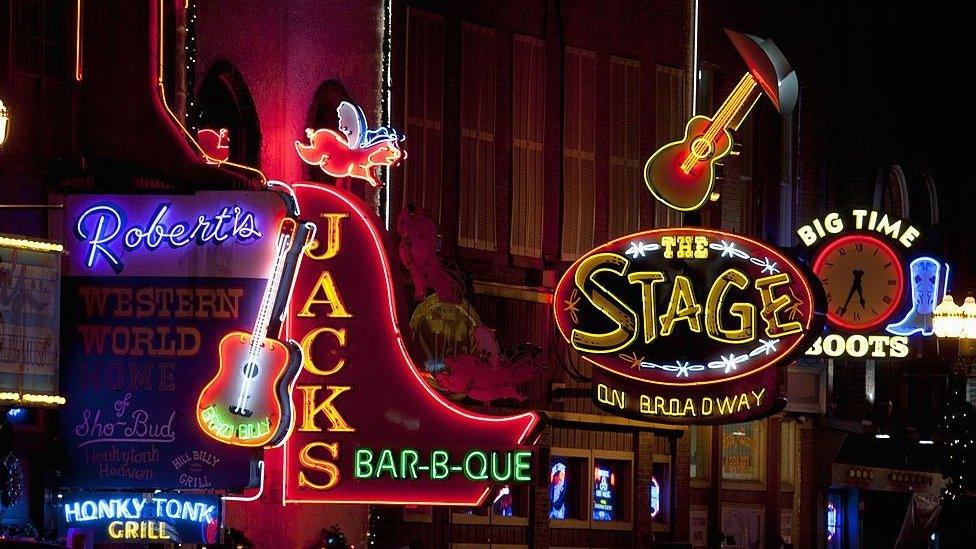
Nashville is a popular spot for hen parties and bachelorettes
Over the sound of live country music reverberating into the streets, the more common refrain was simply: "I don't want to talk about it, I don't want to think about it." Others said they were unsure about the ruling's impact, and they needed to read up on the new rules.
One bride-to-be, wearing a fluorescent dress and a white cowboy hat, said she agreed with the decision, but was carried away by her friends before she could say more. "I agree," she said. "I just do."
But from inside the same multi-level bar, Morgan Kiernan, who's travelled from Ohio to celebrate her 24th birthday, said the impact on her future is clear.
"I'm trying to build myself up to be able to provide for a family one day and be very independent," she says, breaking away from her group as they queued to head to the rooftop.
"If I had a child right now, and had to have that child, I'd be devastated, and it would be a lot harder for me to progress."
Abortion is expected to be severely restricted in about half of US states, with 13 states, including Ohio and Tennessee, expected to implement bans in a matter of weeks.
No exceptions are made for victims of rape, assault, or incest, under Tennessee's abortion laws. Women seeking abortions do not face prosecution in the state, but abortions providers and those enabling the services will.
"I am a pro-life person, of course, God put us here," said Heather Hamlin, 40, massaging her baby bump while she shops with her daughters around the corner from the city's iconic "Honky Tonk Highway".
She is heavily pregnant with her sixth baby, the gender of which she hasn't revealed to her two girls yet, and finds it difficult to accept abortion in even the most difficult of circumstances.
"There's rape, there's incest, there's different things that happen where it's horrible. It's horrible. That's terrible. But the baby's Jesus," she said.
Ms Hamlin fears misinformation is being spread about the ruling, which she said does not mean women will be denied treatment in a medical emergency.
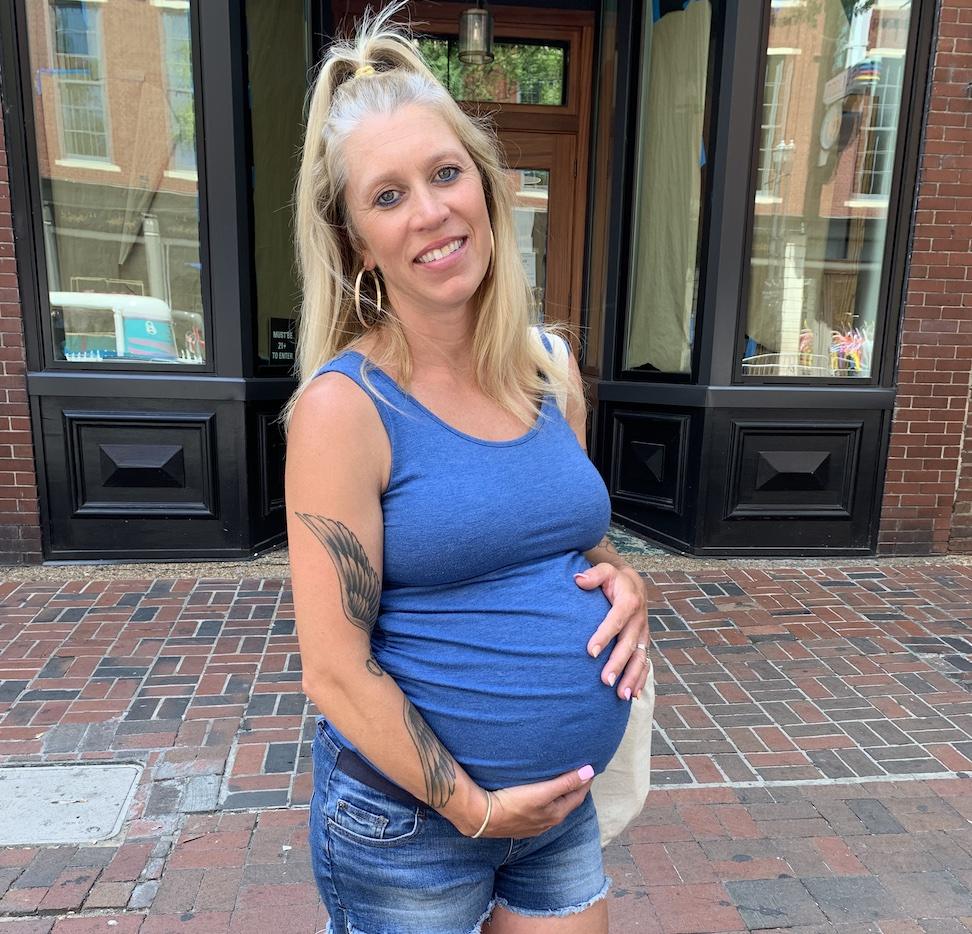
Heather Hamlin, mother of 6, supports banning abortion
"I've been in those situations, we actually lost a baby at 20 weeks. I had premature rupture of membranes and our little girl that we were expecting at five months passed," she said, her voice breaking about her second miscarriage. "I would do anything to have those babies back."
"What they're trying to stop is people who are murdering essentially healthy babies," she added, trying not to smudge her metallic eyeliner. "It's just giving a little one a voice."
Originally from Wisconsin, she said she had her first child aged 29 when she became pregnant despite being on contraception. Unmarried, she wasn't sure if she wanted children but said there was "no other choice" after she saw the first ultrasound.
"And she's beautiful," she said, as her oldest daughter clings, embarrassed, to her cobalt blue tank top.
An hour later, just a 15-minute walk away from the city's main party hub, cheers had been replaced by chants. Thousands of people had gathered outside the city's legislative plaza, the centre of the state's lawmakers, to protest the decision.
"We won't go back!" placards read. "Hands off our bodies!" Many more were political: "Don't like abortions?" one protester wrote. "Then ignore them like mass shootings."
Mid-way through, there were concerns the march would escalate after two members of the Proud Boys, a far-right group, turned up on bikes. But the protest was heavily policed.
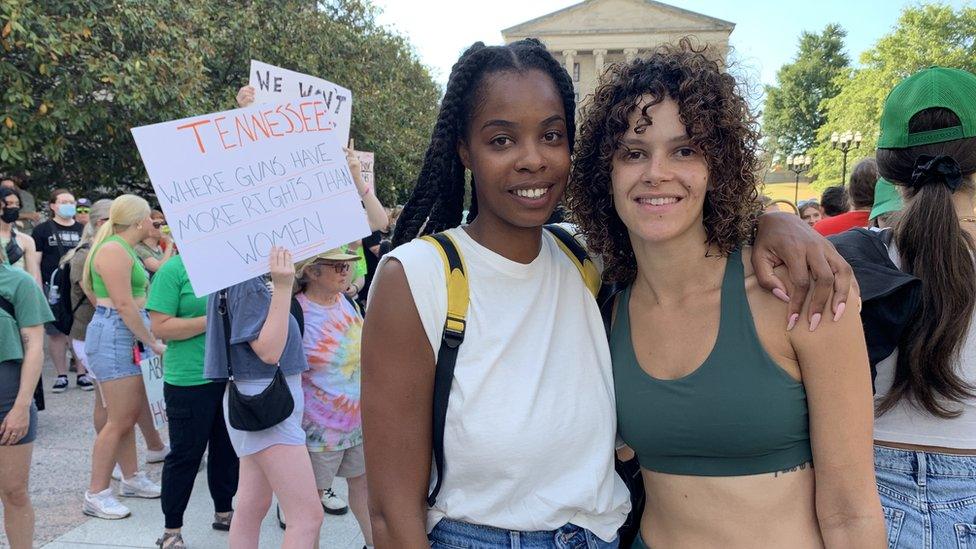
Tatiana Walton (right) protested
Standing with her partner and son in the middle of the crowd, Tatiana Walton, a 30-year-old model from Nashville, said she was in tears over what the ruling meant for future generations.
"I was pregnant at a really young age and I chose to have my son but I absolutely had abortion on the table," she says, shaking her head in disbelief. "And I can't imagine not having that avenue."
When she became pregnant again later in life, she chose to have an abortion and had felt supported.
"We do not need women in jail for abortion," she said. "It's set us back 50 years."
Related topics
- Published27 June 2022
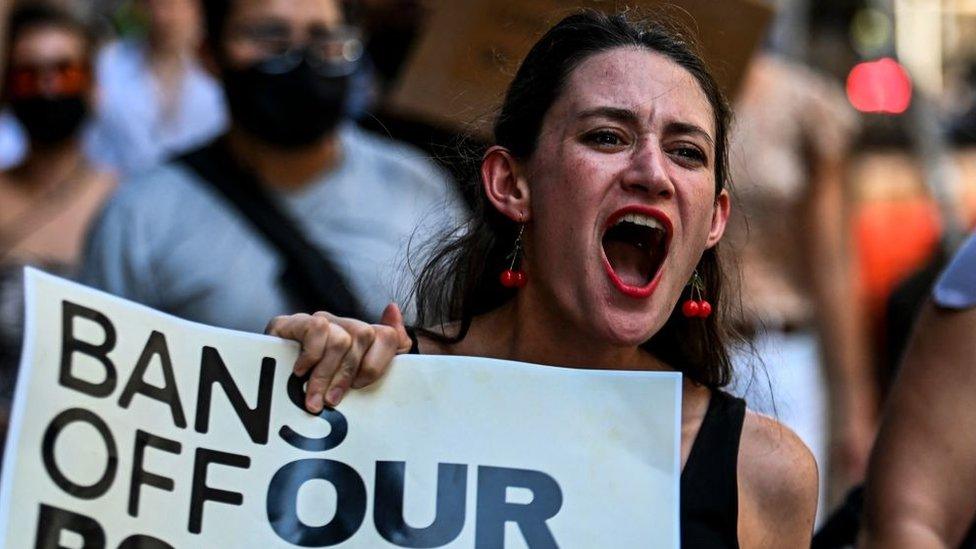
- Published25 June 2022
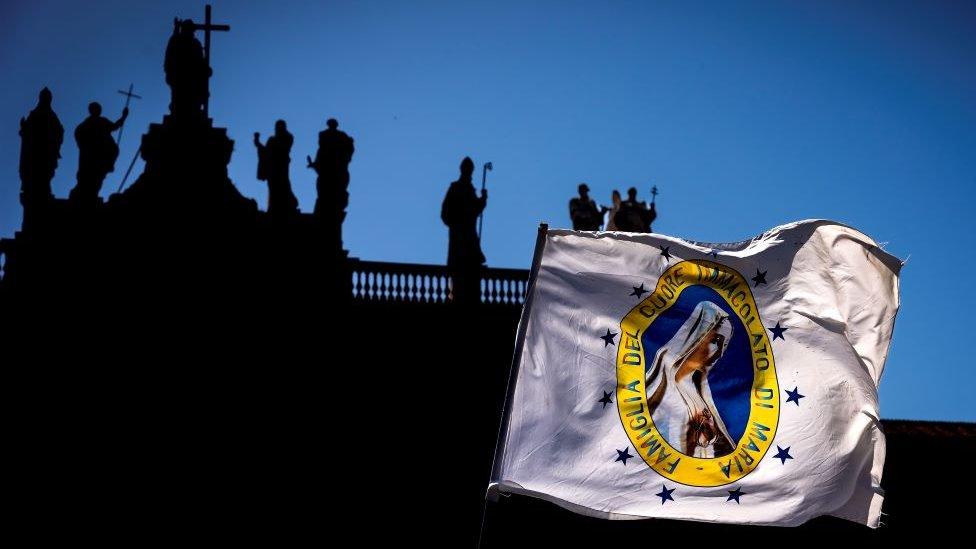
- Published29 June 2022
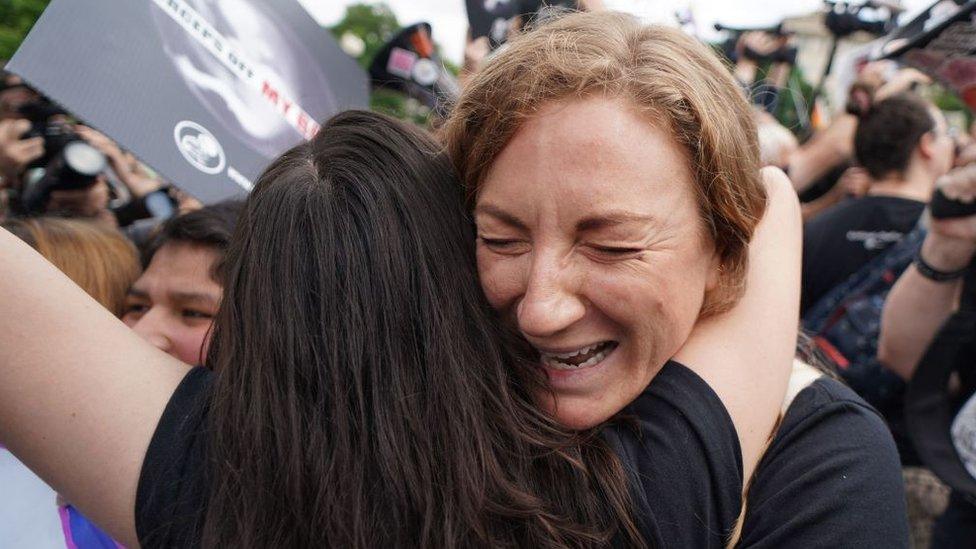
- Published27 June 2022
